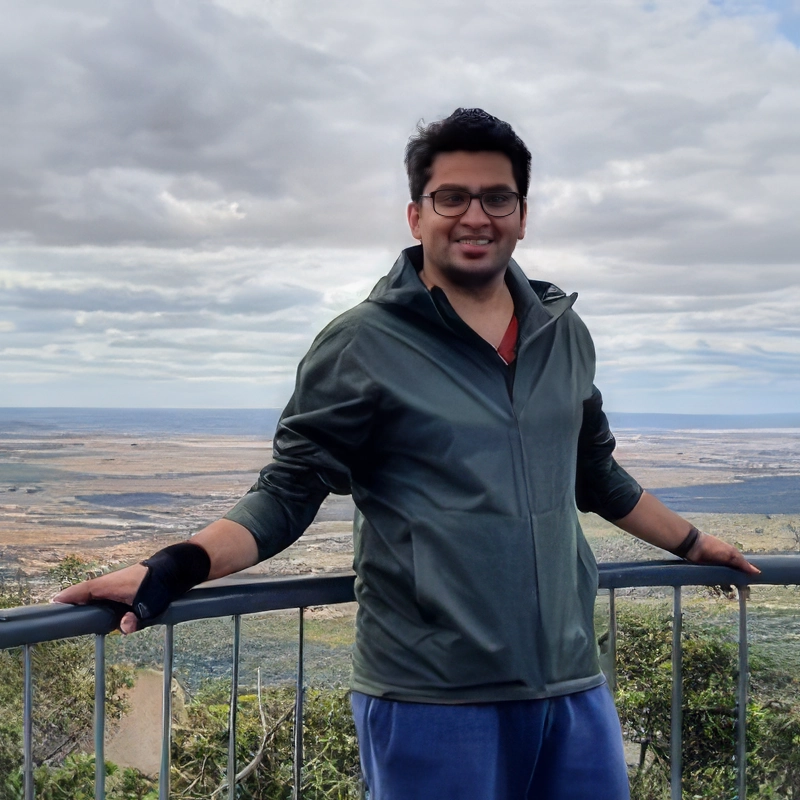Fuel to the fire: Aakash Chhabra, Ph.D., discusses what drives his passion for science

Aakash Chhabra, Ph.D., is a NASA Postdoctoral Fellow at the Earth Science Division at NASA Ames. Chhabra's background is studying fires and forest ecology using satellite data or remote sensing data. He did his Ph.D. research in Australia on studying the effects of bushfires, he says, because it's a land shaped by fires. While writing his dissertation, he wrote down some ideas for future research. Then he learned about the NPP, contacted scientists at NASA and the rest, as they say, is history. In this episode of Further Together, Chhabra discusses his research and urges fellow scientists who have novel ideas to pursue them and seek out opportunities like the NASA Postdoctoral Program where those ideas can flourish.
Center: Ames Research Center
Life, according to Aakash Chhabra, Ph.D., works in contrast: “If there is doubt, there will be light. If there is black, there will be white,” he said. And if there is fire, there will be rebirth.
Fire ecology is the subject of Chhabra’s research in the NASA Postdoctoral Program. On an ever-changing and increasingly warming planet, Chhabra studies why and how wildfires occur, and what their effects on the ecology of the planet are.
“I think it's important to understand first that fires are nothing new to earth,” he explained in a recent interview for Further Together, the ORAU Podcast. “They are a natural element, and they have always existed. They have been a contributing factor to regulating atmospheric conditions or whether it's influencing plant evolution or altering distribution of various biomes. There is strong concern over how these fires are happening and at what intensity, because the science data over the past 100 years shows us the Earth has increasingly warmed, which has led to a rise in temperatures, and that has resulted in increased fire activity. They're growing in intensity, and they are hazard to human life and property and wildlife. That's why it's concerning and it's very critical to look at fires right now.”
Chhabra came to the NPP after conducting his doctoral research in Australia, a land shaped by fire. There, he studied the effects of bushfires using satellite or remote sensing data. While this research inspired the idea behind his work in the NPP, he didn’t always plan on becoming a fire ecologist. He originally set out to become an engineer.
“Engineering was a perfect mix of creativity and problem solving, making an impact on challenges that are working against the society or community,” he explained. “I've always had a knack for imagination, how things work, why they work the way do. So, I think that has been the driving factor for me that has kept me motivated. For me, curiosity is fuel.”
While engineering was a good fit, it wasn’t the right fit for Chhabra. After completing a bachelor’s degree in electronics, then a master’s degree in remote sensing, he worked with satellites. This is where he applied that knowledge to earth sciences and ecology, studying tectonics, crops and biomass burning.
“That narrowed down my interest to pursue a Ph.D.,” he said. “It wasn't anything pre-planned. I think I got lucky to work on a very hot topic, both literally and scientifically.”
Since joining the NPP, Chhabra has enjoyed the opportunities for collaboration.
“I was very clear before joining the NPP that collaboration now has to be on top. It was my priority,” he said. “In my case, collaboration has always been instrumental, and that has been a lesson. When I was younger, I didn't know that collaboration would help in bringing diverse perspectives or expertise or resources. In a nutshell, I think it kind of empowers you to tackle various challenges. I don't think one can do it alone, because I mean, after all, no one can whistle or sing a symphony alone. You need the whole orchestra to do that.”
Chhabra’s passion for his work has moved throughout his career, a wildfire in its own right: unpredictable and yet natural, fueled by his creative spark and curiosity.
